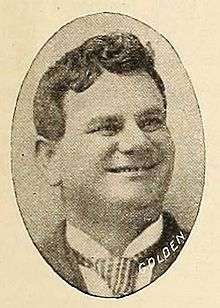Billy Golden
William B. Shires (June 9, 1858 – January 29, 1926), who performed and recorded as Billy Golden, was an American blackface comic and singer who was a popular recording artist between the 1890s and the 1910s.

Biography
He was born in Cincinnati, Ohio, and grew up in St Louis, Missouri. He began performing as a blackface act in vaudeville in 1874 before working as a duo with, first, John Merritt, and then Billy Draiton. He originated a dance move known as the "cane pat" which became popular with blackface minstrels, and, as part of Bailess and Kennedy's "Brightlights" vaudeville act, became particularly associated with the song "Turkey in the Straw". In 1885, he started performing in a duo with his wife, May Golden.[1]
In 1891, he recorded "Turkey in the Straw" for Columbia Records; it became one of the best-selling recordings of the year.[2] He re-recorded the piece many times for Berliner (as well as their successor company Victor), Zonophone, Edison and many others . Other successful recordings by Golden included "Uncle Jefferson" (1891), "Bye Bye, My Honey" (1898), and "Roll On The Ground" (1901).[2] Most of his early recordings were as a solo performer. In 1907 he formed a new duo act with Joe Hughes, and they recorded together for several labels. Golden and Hughes were among the first two-man teams to record blackface minstrel humor in black dialect.[1]
After Hughes retired from performing, Golden began working with Jim Marlowe and then, after Marlowe's death in 1917, with Billy Heins. In 1919, Golden reunited with Hughes for several more recordings. After 1920, Golden continued to perform and record as a solo act. He died in New York City in 1926.[1]
References
- Hoffmann, Frank; Cooper, B Lee; Gracyk, Tim (2012). Popular American Recording Pioneers: 1895–1925. Routledge. pp. 143–147. ISBN 978-1-136-59229-4.
- Whitburn, Joel (1986). Pop Memories 1890-1954: The History of American Popular Music. Menomonee Falls, Wisconsin: Record Research, Inc. pp. 176. ISBN 0-89820-083-0.
External links
- Billy Golden in Discography of American Historical Recordings, at UC Santa Barbara
- Billy Golden cylinder recordings, from the UCSB Cylinder Audio Archive at the University of California, Santa Barbara Library.
- Billy Golden at Discogs.com